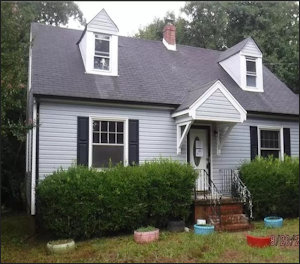
by James A. Bacon
Broadly speaking, there are two ways to create a supply of affordable housing in Virginia. One is to loosen zoning restrictions so developers and home builders can build more houses and apartments, thus relieving scarcity and putting a downward pressure on prices across the board. The other is for the government to arrange for the construction of lower-income housing. Governor Ralph Northam is doubling down on the latter strategy.
Yesterday the Governor announced that his proposed budget will include $92 million in new funding to address housing affordability, eviction rates, and housing for the disabled. Of that sum, $63 million will go to the Virginia Housing Trust Fund, which provides financing for affordable housing.
Here’s the irony. In the Richmond region, the cost for the Richmond Redevelopment and Housing Authority to build new “affordable housing” units runs as high as $250,000 per unit. The median home value — half of the houses on the market are more expensive, half less expensive — in the Richmond market is $223,400, according to Zillow. In other words, it costs government more to build a unit of low-income housing than for the private sector to provide middle-income housing.
Why would that be? I posit the existence of a “housing/industrial complex” in which vast sums of money are consumed by planning, consultants, studies, and administrative overhead; and, further, in which developers and home builders must penetrate a thicket of rules and regulations, thus reducing the number of participants in the lower-income market and suppressing price competition. That’s over and above the challenge of getting local government permission, often in the face of NIMBY resistance, to find a location to build the housing.
Whatever the exact case, so-called “affordable” housing provided by the government is unaffordable to the taxpayer.
The root cause of unaffordable housing is the inability of supply to keep up with demand. Between 2010 and 2017, according to American Community Survey data, Virginia’s population increased by 6.6% while the number of housing units increased only 3.0%. When more people bid for a limited supply of houses (either to buy or rent), the price of houses goes up! This is not rocket science!!
So, Virginia can continue down its path of suppressing home building through local zoning codes and regulations, or pretending to do something by making paltry symbolic gestures — at the expense of taxpayers — that accomplish almost nothing. The $63 million Northam proposes to put in the Virginia Housing Trust Fund is the equivalent of building about 250 housing units at $250,000 a pop, if we use Richmond prices as a benchmark — and fewer units if we use Northern Virginia’s $350,000 per unit as a benchmark. Compared to the magnitude of the problem, the benefit to Virginia’s poor will be imperceptible.
Without fundamental reforms to zoning policies and housing markets, population will continue to outstrip the supply of new housing, prices will continue to push higher, the cost of housing will become increasingly unaffordable to lower-income Virginians, and the brain-dead political class will “do something” about the problem by pouring more taxpayer money into failed solutions.

Leave a Reply
You must be logged in to post a comment.